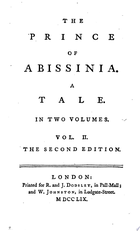Quotes from book
The History of Rasselas, Prince of Abissinia

The History of Rasselas, Prince of Abissinia, originally titled The Prince of Abissinia: A Tale, though often abbreviated to Rasselas, is an apologue about bliss and ignorance by Samuel Johnson. The book's original working title was "The Choice of Life".At the age of fifty, he wrote the piece in only one week to help pay the costs of his mother's funeral, intending to complete it on 22 January 1759 . Though this is still popular belief, Wharton and Mayerson's book, "Samuel Johnson and the Theme of Hope," explains how James Boswell, the author of Johnson's biography-- "The Life of Johnson" -- was "entirely wrong in supposing that Rasselas was written soon after his mother's death" . It wasn't a way of "defraying" the expenses of the funeral. In fact, Johnson wrote Rasselas instead of going to see his mother while she still survived. It was written in anticipation of her funeral. Edward Tomarken writes in his book, “Johnson, Rasselas, and the Choice of Criticism”, that this belief was not questioned until 1927 as “...the tradition of the gloomy, funereal tone of the choice of life motif in Rasselas remained unopposed: the question of whether or not the genesis of Rasselas involved a literal funeral was not considered important. Moreover, the assumption of a gloomy genesis served to keep religion in the background, for any theological difficulty could be attributed to the fact that the author was mourning the death of his mother” .The book was first published in April 1759 in England. Johnson is believed to have received a total of £75 for the copyright. The first American edition followed in 1768. The title page of this edition carried a quotation, inserted by the publisher Robert Bell, from La Rochefoucauld: "The labour or Exercise of the Body, freeth Man from the Pains of the Mind; and this constitutes the Happiness of the Poor".Johnson was influenced by the vogue for exotic locations including Ethiopia. He had translated A Voyage to Abyssinia by Jerónimo Lobo in 1735 and used it as the basis for a "philosophical romance". Ten years prior to writing Rasselas he published The Vanity of Human Wishes in which he describes the inevitable defeat of worldly ambition. Early readers considered Rasselas to be a work of philosophical and practical importance and critics often remark on the difficulty of classifying it as a novel. Johnson was a staunch opponent of slavery, revered by abolitionists, and Rasselas became a name adopted by emancipated slaves.

Source: The History of Rasselas, Prince of Abissinia (1759), Chapter 31
Context: “That the dead are seen no more,” said Imlac, “I will not undertake to maintain against the concurrent and unvaried testimony of all ages and of all nations. There is no people, rude or learned, among whom apparitions of the dead are not related and believed. This opinion, which perhaps prevails as far as human nature is diffused, could become universal only by its truth: those that never heard of one another would not have agreed in a tale which nothing but experience can make credible. That it is doubted by single cavillers can very little weaken the general evidence, and some who deny it with their tongues confess it by their fears.
“Yet I do not mean to add new terrors to those which have already seized upon Pekuah. There can be no reason why spectres should haunt the Pyramid more than other places, or why they should have power or will to hurt innocence and purity. Our entrance is no violation of their privileges: we can take nothing from them; how, then, can we offend them?”

Source: The History of Rasselas, Prince of Abissinia (1759), Chapter 31
Context: “That the dead are seen no more,” said Imlac, “I will not undertake to maintain against the concurrent and unvaried testimony of all ages and of all nations. There is no people, rude or learned, among whom apparitions of the dead are not related and believed. This opinion, which perhaps prevails as far as human nature is diffused, could become universal only by its truth: those that never heard of one another would not have agreed in a tale which nothing but experience can make credible. That it is doubted by single cavillers can very little weaken the general evidence, and some who deny it with their tongues confess it by their fears.
“Yet I do not mean to add new terrors to those which have already seized upon Pekuah. There can be no reason why spectres should haunt the Pyramid more than other places, or why they should have power or will to hurt innocence and purity. Our entrance is no violation of their privileges: we can take nothing from them; how, then, can we offend them?”